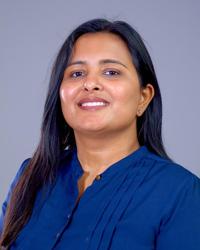
Diabetes affects millions of Americans and remains a leading cause of chronic health complications. Family medicine physician Dr. Priyanka Chaudhari recently presented on the importance of awareness, timely diagnosis and lifestyle management alongside medication to achieve long-term wellness.
Type 2 diabetes is a systemic disease characterized by hyperglycemia — or high blood glucose levels — initially caused by insulin resistance and eventually leading to decreased insulin production.
Dr. Chaudhari explained, “When I mention insulin resistance, what it means is insulin is present, but your cells are not reacting to bring your glucose down in relation to the insulin secretion.”
For diagnosis, Dr. Chaudhari outlined three criteria for non-pregnant adults: fasting blood glucose of 126 mg/dL or higher after an eight-hour fast, a two-hour glucose tolerance test result of 200 mg/dL or higher, or a hemoglobin A1C of 6.5% or greater. Any one of these tests, repeated or confirmed with a second test, can establish a diagnosis.
She also highlighted prediabetes as an important precursor to diabetes, defined by slightly elevated glucose levels or A1C between 5.7% and 6.4%, with ongoing monitoring recommended annually.
The prevalence of diabetes is staggering. According to the Centers for Disease Control and Prevention, 38.4 million Americans — approximately 11.6% of the population — have diabetes, and nearly 98 million more have prediabetes.
“It’s such a common and big disease that affects health care costs a lot,” Dr. Chaudhari said, referencing the $413 billion spent on diabetes care in 2022.
When it comes to managing Type 2 diabetes, lifestyle interventions are foundational. Dr. Chaudhari stressed the importance of exercise, nutrition, sleep, stress management and avoidance of substances like tobacco and excess alcohol. She recommends at least 30 minutes of moderate-intensity physical activity — such as brisk walking, swimming or jogging — five days a week, combined with strength training at least twice weekly.
“Breaking up prolonged sedentary time should also be encouraged,” she added, noting that exercise improves insulin sensitivity and lowers post-meal glucose levels.
Nutrition plays a key role. Dr. Chaudhari advocates for fiber-rich, plant-based foods while minimizing saturated fats.
“Patients should not fear carbohydrates; rather, focus on more unprocessed, fiber-rich carbohydrates from whole grains, legumes, fruits and vegetables,” she said.
Research supports Mediterranean and plant-predominant diets, which can delay the need for medication and reduce cardiovascular risk. Adequate protein intake, particularly from plant sources, supports weight loss and preserves lean muscle mass.
Sleep and stress management are equally important. Dr. Chaudhari emphasized, “Sleep is as important as your physical activity and your diet. Poor sleep quality was associated with a 40%-84% increased risk of developing Type 2 diabetes.”
She encourages consistent sleep schedules and mindfulness practices to manage stress, which is increasingly recognized as a contributor to insulin resistance.
Medication management is individualized, based on patient history, comorbidities and lifestyle factors. Common treatments include metformin, GLP-1 agonists and SGLT2 inhibitors, among others. For advanced cases, insulin therapy may be necessary. Continuous glucose monitoring devices, such as Dexcom or Freestyle Libre, help patients track real-time glucose levels and maintain them in the target range of 70-180 mg/dL for most of the day.
Preventing complications is another cornerstone of care. Dr. Chaudhari emphasized regular screenings: “Annual eye exams, foot exams, kidney and liver function tests and dental checkups are essential,” along with appropriate vaccinations, blood pressure control and statin therapy when indicated.
“Lifestyle changes will help you tremendously in the prevention of the disease, as well as if you have the disease, to prevent complications and also help you with remission and prevent a relapse,” Dr. Chaudhari concluded.
Learn more about diabetes from Northside Hospital.
Need a primary care provider? Find one near you and schedule your next appointment online.
References:
- National Diabetes Prevention Program (CDC)
- MyPlate.gov (USDA)
- American Diabetes Association
- American Board of Lifestyle Medicine

